#naples 1815
Text
Just released:
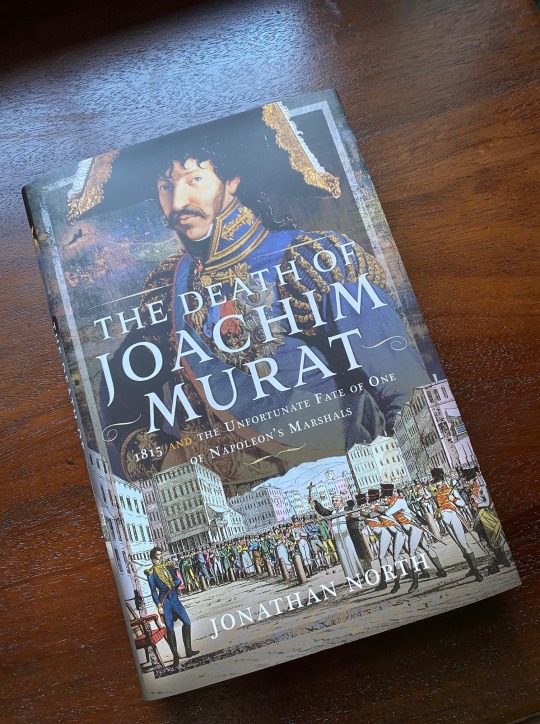
I had the privilege of reading the first draft of this, so I’m really looking forward to the final, polished version. Jonathan North has utilized archival sources from both France and Naples, including the diary of one of Murat’s aides who accompanied him on his final journey, to put together the most thorough examination of the events leading up to Murat’s death ever published.
The book is available now in the UK (see the post on Jonathan’s page linked below for where you can buy it from) and should be available in the US next month (Amazon shows December 30).
62 notes
·
View notes
Text

I found this picture of Murat’s execution on Pinterest and I don’t know what exactly it is but this depiction just hurts… I guess it’s the fact that he looks slimmer and you can feel the realisation that he f-ed up big time. He looks so miserable, there is nothing heroic about this. This execution feels as unnecessary as it was.
I want to put him on a ship and make sure that he finds his way to his kids and wife. :(
41 notes
·
View notes
Text
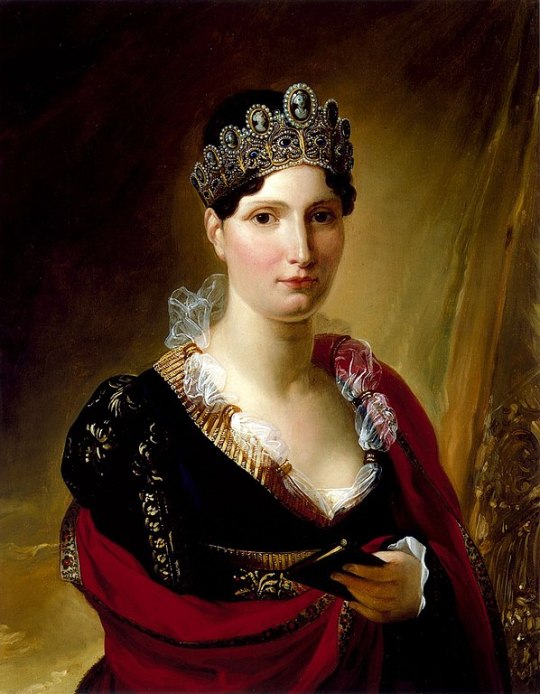
Elisa Bonaparte Baciocchi by Joseph Franque, 1812
Elisa Bonaparte was born on January 3, 1777. She was not as well-known as her sisters, beautiful Pauline and treasonous Caroline, but she was more capable than either of them. In fact, she was the Bonaparte sibling most like Napoleon, although she had the least influence over him. Napoleon himself said, “Elisa has the courage of an Amazon; and like me, she cannot bear to be ruled.” In 1805, he made her the Princess of Piombino and Lucca, where she formed an elaborate court, in imitation of the one in Paris. She took her duties seriously, ruling as a benevolent despot.
Elisa did such a good job that, in 1809, Napoleon made her Grand Duchess of Tuscany, a place she had long had her eye on. She moved her court to the Pitti Palace in Florence, which she refurbished in competition with Caroline’s court in Naples. Elisa's husband, Félix Baciocchi, commanded the local military division under his wife’s supervision. The two lived apart and took lovers.
When Napoleon’s empire began to crumble in 1814, Elisa broke away from her brother, hoping to save her own position. It was no use, as the Tuscans showed no sign of attachment to her and Elisa and Baciocchi had to flee. They tried, unsuccessfully, to make off with the silver and furniture from several of the palaces.
When Napoleon escaped from Elba and returned to France in March of 1815, the Austrians arrested Elisa and imprisoned her. She was released once Napoleon was safely on his way to exile on St. Helena. Elisa was given permission to live in Trieste, where she assumed the title of Countess of Compignano. She died of infection on August 7, 1820, at the age of 43.
When news of Elisa’s death reached Napoleon, he shut himself up alone for several hours. When he emerged, he said, “There is the first member of my family who has set out on the great journey; in a few months I shall go to join her.” He died nine months later, on May 5, 1821.
For more about Elisa, see "Elisa Bonaparte Baciocchi, Napoleon's Capable Sister."
38 notes
·
View notes
Photo

Elisabeth Louise Vigée Le Brun (French, 1755 - 1842)
Life Study of Lady Hamilton as the Cumaean Sybil, 1792
The Met Museum
Emma Hamilton (1765–1815) rose from the lowest rank of society to the peak of distinction by marrying, in 1791, Sir William Hamilton, English ambassador to Naples. There she was famous for her “attitudes”—tableaux vivants performed before swooning audiences who felt themselves transported back to antiquity.
#Emma hamilton#elisabeth louise vigee le brun#art#fine arts#women artist#female artist#art history#world history#classical art#life study of Lady Hamilton as the Cumaean Sybil#Sybil#fine art#oil painting#a study#western civilization#french art#french#france#paris#woman#female portrait#female#portrait#beautiful art#actress#ancient actress
153 notes
·
View notes
Text
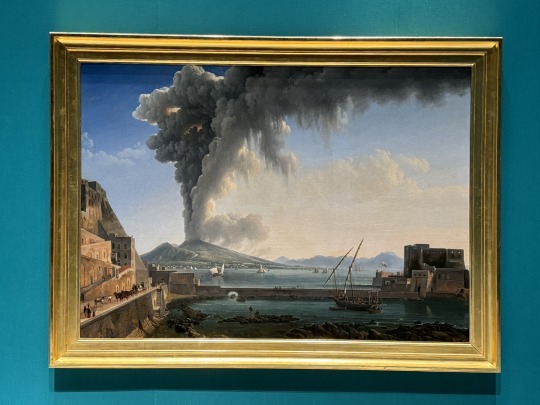


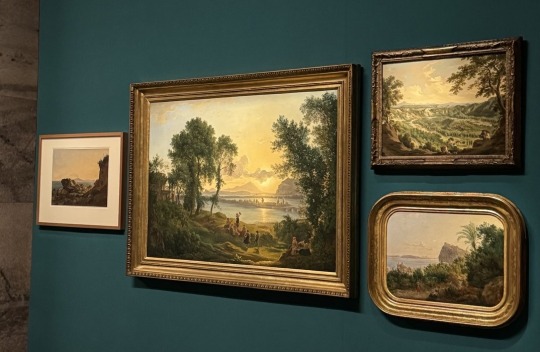

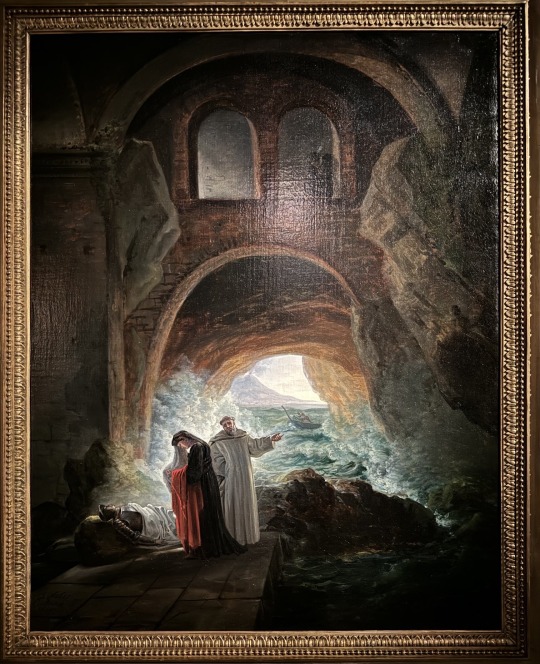
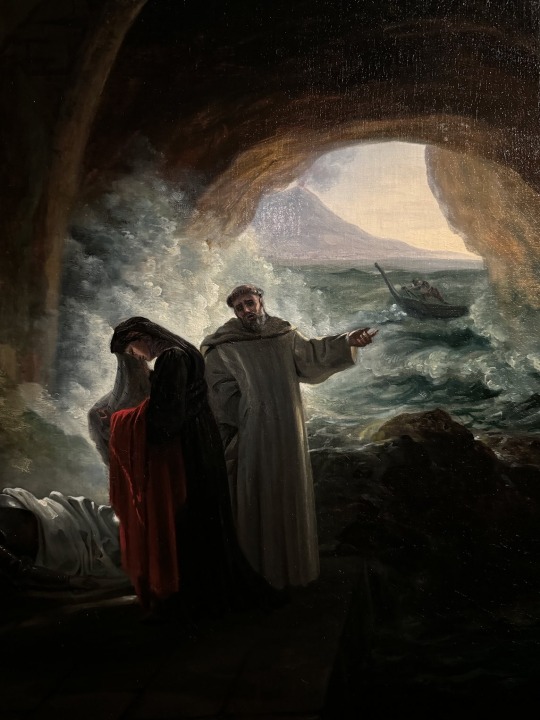
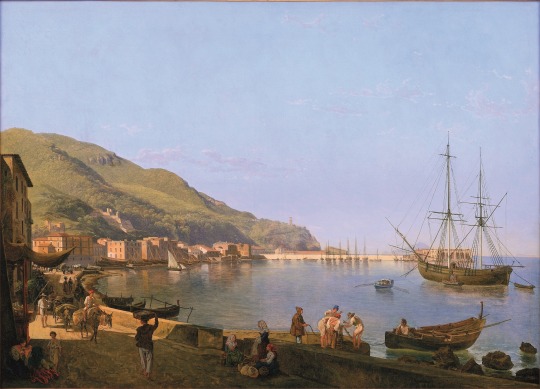
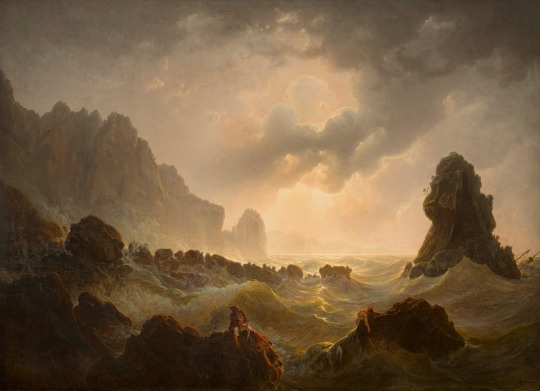

Naples a l'époque de Napoléon : Rebell et la lumières du golfe
Naples in the time of Napoleon. Rebell and the light of the Gulf
Naples in the time of Napoleon. Rebell and the light of the Gulf restores the atmosphere and image of the city in the years from 1808 to 1815, when Joachim Murat and his consort Caroline Bonaparte, the youngest of Napoleon's three sisters, were the much-loved rulers of Naples. This was a period of progress and renewed splendour for the kingdom, marked by extraordinary social, economic and urban transformations and particular attention towards the territory. The culture of the Murats and their modern taste acquired in Paris gave the arts a considerable boost, dividing their time between the official royal palaces of Naples and Caserta and their favourite private residence in Portici.
Patrons of the great portrait painters, Joachim and especially Caroline showed a particular sensitivity for veduta and landscape painting, calling French masters in the genre to their court, Special protection was reserved for the Viennese artist Joseph Rebell, who, along with other specialists in veduta painting, features prominently in this exhibition. Rebell spent several periods of time in Italy between 1812 and 1824, particularly in Naples.
Views of the city, its gulf and magnificent surroundings were his favourite subjects, even after leaving Naples in 1815, fuelling in Europe the myth of the unique nature of this enchanted land celebrated by the painters of the Grand Tour. His training and success are evoked and set against the backdrop of the cosmopolitan Neapolitan scene between the end of the 18th century and the second decade of the 19th century, marked by the presence of numerous travellers and landscape painters who profoundly renewed the vision of reality.
The Murat family itself is also a protagonist of the exhibition, with the presence of numerous portraits, paintings and sculptures bearing witness to the important role it played at that time.
The works are on loan from prestigious organisations, including the Belvedere of Vienna, partner of the exhibition, other major Austrian museum, such as the Vienna Academy of Fine Arts and the Austrian National Library, and French museums such as the Château of Fontainebleau and Versailles.
The exhibition is curated by Sabine Grabner, Luisa Martorelli, Fernando Mazzocca and Gennaro Toscano, with the collaboration of the Institut français in Naples.
Dates: November 23 2023 - April 7 2024
(Gallerie d’Italia)
#Gallerie d’Italia#napoleonic era#napoleonic#Caroline#Murat#Caroline Bonaparte#Joachim Murat#napoleon bonaparte#first french empire#napoleon#french empire#france#19th century#Naples#Napoli#Italy#Joseph Rebell#Rebell#Neapolitan#Naples a l'époque de Napoléon : Rebell et la lumières du golfe#Naples in the time of Napoleon#Naples in the time of Napoleon. Rebell and the light of the Gulf#Rebell and the light of the Gulf#art#Rebell et la lumières du golfe#19th century art#1800s art#veduta
26 notes
·
View notes
Photo
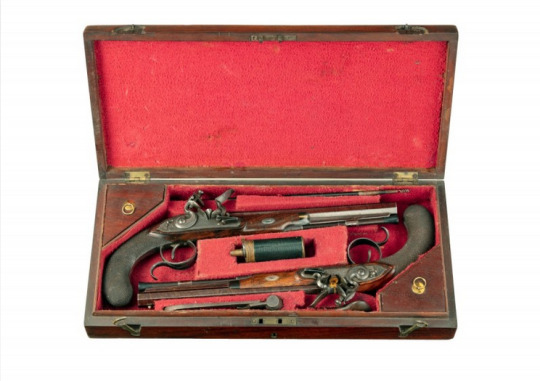

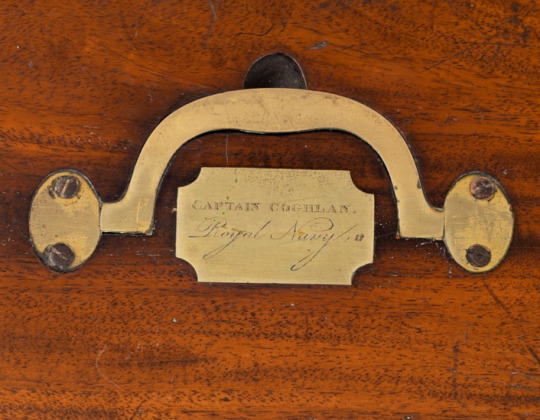
A pair of flintlock duelling pistols by Twigg of London, owned by Captain Jeremiah Coghlan (1774-1844), English, circa 1785
Captain Jeremiah Coghlan (1774-1844) was famous for his extraordinary daring in a series of naval engagements. After going to sea in the Merchant Service, Coghlan attracted the attention of Captain Pellew when he secured a line for the troopship Dutton before the ship sank off Plymouth in 1796. Like the fictional Hornblower, for whom he was the godfather in real life, Coghlan was taken on by Pellew as an ensign on the Indefatigable, where he continued to impress in a series of daring boat actions. After his rapid promotion to lieutenant, Coghlan was given command of the cutter Viper, from which he led the elimination of the Cerbère at Port Louis in Brittany against almost insurmountable odds. He surpassed this exploit when, greatly outnumbered and outgunned on both occasions, when he destroyed General Ernouf off San Domingo and captured the Diligent off Puerto Rico.
Coghlan was also successful on land, leading 200 marines in the capture of the citadel battery at Cassis in southern France in 1813, before forcing the surrender of Joachim Murat, King of Naples, in May 1815, securing the city and its treasures for the restoration of the Bourbon royal family. Having dined with Nelson in 1800, Coghlan was given the double honour of dining with Napoleon when the Emperor was taken to Elba for short-lived exile.
During his career, Coghlan received a number of presentation arms, including a 100 Guinea sword from Admiral Earl St Vincent. Given the date and nature of the weapons, it is likely that his dueling pistols were also a gift, possibly from his patron Admiral Edward Pellew, Viscount Exmouth.
#naval weapons#duelling flintlock pistols#captain jeremiah coghlan#18th century#age of sail#captain pellew
146 notes
·
View notes
Text
The Calendar of Monte Cristo: Chapter 1
When we were reading The Count of Monte Cristo last year, it occasionally bugged me that I couldn't find a timeline of the events - whenever I went searching for one, all I could find were timelines of the writing and publication of the novel. So this time around I'm going to make notes and maybe make my own.
c.1785-1791: Napoleon Bonaparte garrisoned at Valence. Policar Morrel serves in the same regiment. [H]
c. 1790: Danglars born. [R]
c. 1796: Edmond born. [R]
some time before 24 February 1815: Maximilien Morrel born. [R]
c. December 1814: Pharaon departs Marseille for a voyage to Naples, Trieste and Smyrna. [R]
Final voyage of Captain Leclère. Pharaon stops at Elba and Edmond entrusted with message. [R]
24 February 1815: Pharaon arrives Marseille. Edmond speaks to M. Morrel, visits father and Mercédès. [E]
E: date explicitly stated in text
H: historical event
R: located relative to another event
#the cristo account#the calendar of monte cristo#chapter 1#the count of monte cristo#alexandre dumas#not a reblog
28 notes
·
View notes
Photo
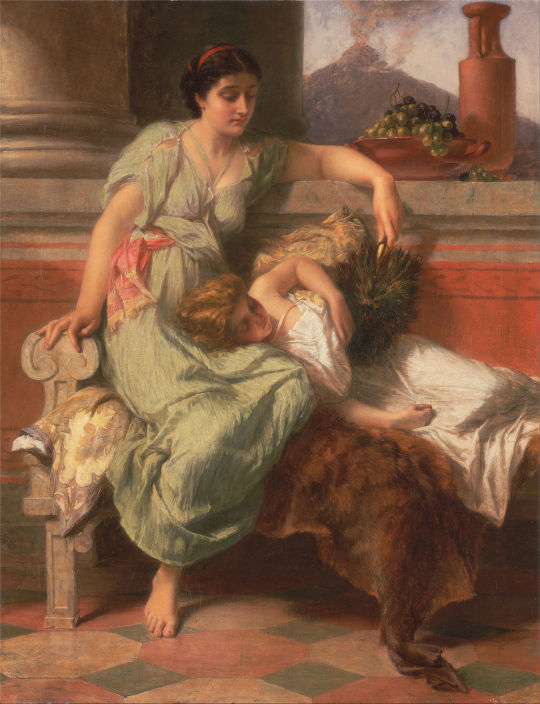
On this day, almost 2,000 years ago, one of the worst natural disasters in history ended life in Pompeii and Herculaneum. They didn't even know there was such a thing as a Volcano. Vesuvius, inactive for more than a thousand years, was to them a beautiful mountain full of grass and vineyards.
In the morning, a thin column of smoke began to rise from the mount; at about 1pm the top of the mountain exploded. It was 79 AD according to our calendar, It was the year 832 for them.
In a few minutes the wind propelled a colossal ash cloud toward Pompeii, blocking sunlight; Ash, pumice stones and volcanic debris began to fall on the city; This terrifying "rain" would last until dawn the next day
Herculaneum, located on the other side, thanks to the wind blowing in the opposite direction, was saved from the darkness, the rain of ashes and the fall of pumice stone. This allowed many people to flee the city in time; People in Pompeii had no way of escape. But ironically, hundreds of people in Herculaneum died before and the city disappeared hours before Pompeii. Twelve hours after the start of the eruption, a pyroclastic surge broke off from Vesuvius and flowed down the slopes like a cascade straight to Herculaneum. Due to the proximity of this city to the volcano, the pyroclastic surge arrived with all its initial heat, evaporating the flesh of the victims Instantly. A second pyroclastic flow followed the course of the first and fell on the already dead city.
In Pompeii, many people died from the collapse of the roofs under the stones in the first hours, but the vast majority of the population survived for hours; many sheltered in safe places in their homes, others in public buildings. At about 6 am the falling stones had already stopped but the volcano became more lethal; A third pyroclastic surge headed towards Pompeii but stopped at the outer north wall of the city. At 7 am the fourth surge reached Pompeii as a scorching hurricane, killing everyone. Being this city further away from the volcano than Herculaneum, the pyroclastic flow arrived colder but hot enough to cause a dreadful death by suffocation and burns in a throes of at least 2 minutes. A fifth surge followed the same course.
At about 7:30 am the last and most powerful pyroclastic flow buried Pompeii, Herculaneum and all the surrounding villas, destroy large part of Stabia where Pliny the Elder died; advanced through the Bay of Naples until reaching the coast of Misenum, where Pliny the Younger was, who saw it all and wrote in detail everything that happened; He was the first to document this type of volcanic eruptions, which is why they are known as plinian eruptions.
Most of Stabia was rebuilt decades later, although it would never again have the prestige it had before the tragedy.
Pompeii and Herculaneum would remain buried for 16 centuries.
This tragedy killed thousands of people, but preserved the wonders and magic of these ancient Roman cities. Magnificent frescoes and mosaics, beautiful buildings, precious objects, and even graffiti that tells us about the daily life, the beliefs, stories of love, passion, and dreams of an ancient people.
Part of Pompeii and most of Herculaneum remain buried to this day, so there are still unimaginable treasures to be discovered.
Text by: ancientcharm
Image: Pompeii, A.D. 79 by Alfred Elmore (1815-1881)
203 notes
·
View notes
Photo

Joachim Murat
Joachim Murat (1767-1815) was a French cavalry officer who fought in the French Revolutionary Wars (1792-1802) and Napoleonic Wars (1803-1815). He was appointed marshal of the French Empire in 1804, Grand Duke of Berg in 1806, and ruled as King of Naples from 1808 until 1815. Through his marriage to Caroline Bonaparte, he was the brother-in-law of Napoleon I.
Continue reading...
24 notes
·
View notes
Text
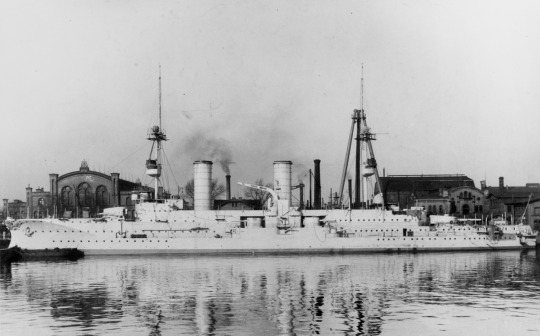
On this day:
INEXPLICABLE DISAPPEARANCES
On January 28, 1914, the ocean liner Prinz Heinrich inexplicably lost one of its passengers. James Regan and all his luggage vanished midvoyage between Marseilles and Naples. The ship was full, but no one saw him go overboard.
In 1815, a Prussian captain, Fritz Alswanger, died of apoplexy, and his servant, Diderici, began to impersonate him. The clever valet managed to collect his boss's paycheck and court ladies of elite society before the deception was discovered. Incarcerated in the Weichselmunde prison, with its twenty-foot-high walls, Diderici was kept manacled. One day, in the middle of a line of shackled prisoners out in the yard for exercise, he began to fade away, becoming more and more ghostly until finally his metal leg and hand cuffs clanked to the ground, empty. Diderici was never seen again.
In 1848, in Australia, explorer Ludwig Leichhardt attempted a second expedition across the country's daunting central desert. All of the men and the expedition's seventy pack animals completely vanished. Over 125 years later, photos of aboriginal cave paintings depicting Leichhardt's expedition came to the attention of Australian ranger Zac Mathias. Mathias arranged for an expedition of his own to find the cave paintings, but just before they set out, Mathias himself completely disappeared.
Text from: Almanac of the Infamous, the Incredible, and the Ignored by Juanita Rose Violins, published by Weiser Books, 2009
5 notes
·
View notes
Text
THIS DAY IN GAY HISTORY
based on: The White Crane Institute's 'Gay Wisdom', Gay Birthdays, Gay For Today, Famous GLBT, glbt-Gay Encylopedia, Today in Gay History, Wikipedia, and more

44 BC – Italy: The first written reference to same-sex marriage appears when Cicero insults promiscuous Mark Antony whose father Curio "established you in a fixed and stable marriage, as if he had given you a stola." A stola is a traditional garment worn by married Roman women. Cicero’s sexual implications are clear, the point of which is to cast Antony in the submissive role in the relationship and to impugn his manhood.

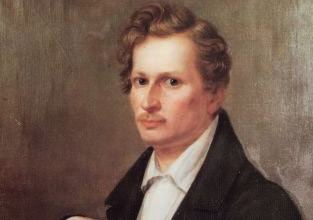
1796 – The poems of Count August von Platen (d.1835) are homoerotic expressions of Platonic love, idealism, beauty, friendship, and longing. Platen was born in Ansbach, Bavaria, the son of an impoverished nobleman. He attended the Military Academy at Munich and the Royal Institute of Pages resulting in his commission as a lieutenant in 1815 in a regiment against France during the time of Napoleon; he, however, engaged in no action.
Platen was extremely erudite, mastering a dozen languages, including literary Greek and Latin, French for social status, Persian for poetic reasons, and even English.
An admirer of Michelangelo and Italian art, Platen visited Florence, Rome, Naples, Syracuse, and Sicily. While in Naples in the 1820s, he formed a homosexual friendship with the poet and painter August Kopisch, all the while perfecting the content and form of his poetry. By 1826, he had moved permanently to Italy, supported by a pension from his friend, King Ludwig I of Bavaria.
Focusing his sexual urges into the artistic and creative realms, Platen transformed his passion for same-sex relations from the physical to the intellectual. On occasion, a friendship lasted only a year or so—for example, his intense relationship with a young painter, Rühl—but it nevertheless served to heighten his creative powers.
His controversial, multilingual, autobiographical narrative, which contains an explicitly erotic homosexual theme, was not published until the end of the nineteenth century, under the title Diary (Die Tagebücher, 1896-1900). In his poetry, Platen employs a recurrent homoerotic image borrowed from Persian poetry, the tulip, which is a spiritual symbol for masculine love.
Platen's longing for love and friendship is a persistent motif in his work. He addressed seven sonnets to "Cardenio," an Erlangen student, who is described as a young, tall, dark, and handsome man with full lips. Platen addressed an additional twenty-one sonnets to another Erlangen student, "Karl Theodor German." Embodying themes of Platonic love, friendship, longing, idealism, and beauty, Platen's sonnets express unrequited love for men.
Platen's homosexuality is the subject of a vicious attack by Heinrich Heine in The Baths of Lucca. Edward Carpenter, however, expressed his appreciation for Platen in his Ioälus, An Anthology of Friendship (1902). Among German writers who admired Platen is Thomas Mann, who praised him in a lecture in 1930; Platen's poem "Tristan" (1825) inspired Mann's novella Tristan and Isolde (1903).


1820 – Seventeen year old Ralph Waldo Emerson wrote of his crush on fifteen-year old Martin Gay: I begin to believe in the Indian doctrine of eye fascination. The cold blue eyes of (blank) has so intimately connected him in my thoughts & visions that a dozen times a day & as often by night I find myself wholly wrapped up in conjectures of his character and inclinations. We have already two or three long profound stares at each other. Be it wise or weak or superstitious I must know him.


1960 – Bradley Darryl BD Wong is an American actor, best-known for his roles as Dr. George Huang on Law & Order: Special Victims Unit, as Father Ray Mukada on HBO's Oz, Henry Wu in the movie Jurassic Park, and for his starring role as Song Liling in the Broadway production of M. Butterfly.
Wong gained attention for his Broadway debut in M. Butterfly opposite John Lithgow. The play won multiple awards, including several for Wong. He is notable as the only actor to be honored with the Tony Award, Drama Desk Award, Outer Critics Circle Award, Clarence Derwent Award, and Theatre World Award for the same role.
In 2008, he starred in the one-man show Herringbone, in which he portrays 11 roles, at the McCarter Theatre at Princeton University.
Wong, who is openly gay, began a long-term relationship with talent agent Richie Jackson in 1988. In 2000, Wong had twin sons: Boaz Dov, who died 90 minutes after birth, and Jackson Foo Wong. They were born through a surrogate mother, using Wong's sperm and an egg donated by Jackson's sister. In 2003, Wong wrote a memoir about his experiences with surrogacy titled Following Foo: the Electronic Adventures of the Chestnut Man. Wong and Jackson ended their relationship in 2004.
Wong very strongly identifies as a gay man. Hence, he has been a visible presence at AIDS-related charity functions and in gay and lesbian community events, as well as at events sponsored by the Asian Pacific Islander communities. Wong has appeared at the GLAAD Awards, made promotional spots for the gay and lesbian television newsmagazine In the Life, and worked in various ways to further understanding among both Asians and non-Asians, gays and non-gays, about the experience of being both gay and Asian.


1964 – Dan Mathews is the Senior Vice President of People for the Ethical Treatment of Animals. He is known for heading PETA's most controversial and attention-getting campaigns, including the "I'd Rather Go Naked Than Wear Fur" ads, as well as campaigns involving celebrities such as Morrissey, Pamela Anderson, Pink, and Paul McCartney.
He started poor, was bullied in high school, worked at McDonalds and as a model to put himself through American University, and after graduating started at PETA as a receptionist.
In 2000, he was named by gay lifestyle magazine Genre as one of the most influential people of the new century. When asked by the magazine whom he considered an influential gay person, he replied, spree killer "Andrew Cunanan, because he got Gianni Versace to stop using fur." In 2007, Mathews was ranked 37th in Out magazine's "50 Most Powerful Gay Men and Women in America".
Mathews has written a memoir, Committed: A Rabble-Rouser's Memoir, which he characterized as "an adventure story. It's like 007 wearing freaky outfits". The book tells the story of how he became a public person, the various exploits he's undertaken for PETA, and different campaigns he has done.

In May 2009 he commented on the actions of the governor general of Canada who, in participating in an Inuit tradition, consumed a raw seal heart. He is quoted as saying to the Toronto Star, "It amazes us that a Canadian official would indulge in such bloodlust. It sounds like she's trying to give Canadians an even more Neanderthal image around the world than they already have." Although Mathews admits to being attracted by extremes, he states that he and PETA engage exclusively in legal activities, but they do not necessarily condemn the actions of animal rights extremists.

1912 – The Arizona Supreme Court rules that fellatio is not outlawed by the term "crime against nature."

1981 – The first National Conference on Lesbian and Gay Aging was held in California, sponsored by the National Association for Gay and Lesbian Gerontology. It sought to "dispel myths about older lesbians and gay men, advance research, establish programs and services for lesbian and gay elders, and encourage and provide support for lesbian and gay gerontologists."


8 notes
·
View notes
Text
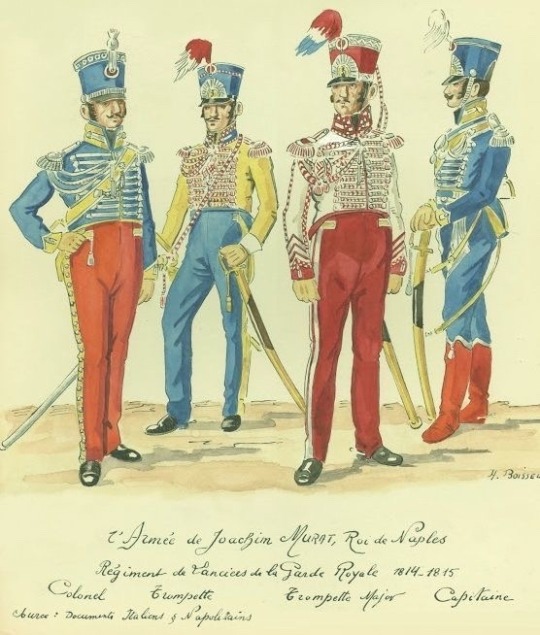
Lancers of Murat’s Royal Guard, Kingdom of Naples, 1814-1815.
#more of Murat’s eye-watering uniform creations#Naples#Joachim Murat#Napoleonic#Napoleonic wars#1814#1815#art
49 notes
·
View notes
Note
Hey Josefa,
May I ask what Soult's relationship with Davout was like, if you were able to find any information on it?
I know that Aimee Davout was friends with Louise Soult but the only thing I can find regarding their husbands' relationship is in 1815 when Napoleon made Soult his chief-of-staff and Davout was incredibly exasperated with Soult's conflicting messages to the point where he threatened to resign as Minister of War multiple times.
Thanks in advance! ☺️
First of all: Thank you, both for your patience and for the question! That's a very interesting one!
I have wondered about it myself, especially when I read sources about the time in Prussia, where these two men are often described as acting in a similar way: Rough, severe, but fair, and holding up strict discipline among their troops. It seems the two had a similar, very methodical approach to their job. Another thing they had in common was the fact they both did not belong to Napoleon’s inner circle and were not as personally close to the emperor and general-in-chief as other marshals (Murat, Lannes, Bessières etc.). Possibly a basis for a bond.
I am unaware (but would love to be corrected on this!) that the two of them ever met before Soult returned from Naples and both he and Davout were nominated colonel général of a branch of the Imperial Guard – another bond they shared. That being said, I have in biographies never come across any mention about a particular friendship between Soult and Davout, so I can only list some correspondence that – for me – could point to those two getting along rather well. Which already says much, as getting along with Soult was not particularly easy.
1.) Soult’s letter of congratulation to Davout, when both of them became marshals in 1804 (already posted here):
Soult to Davout 3 prairial year XII (23 May 1804)
You do not like compliments, and I do not like to make them; thus, my dear Marshal, do not expect any from me; but I will tell you with all the warmth of the friendship I have devoted to you that no one applauded your nomination with more joy than the friend writing to you. I congratulate myself with all my heart to find on the new rank to which His Imperial Majesty has deigned to elevate me, a colleague whom I love and whom I esteem, in short, to find Davout...
That does sound a lot like: Thank god you’re with us, that’s at least one guy who knows his shit… - but mostly, it seems to be a very personal letter, directed at somebody whom the writer knows well.
2.) In »Le Maréchal Soult, prince d’Eckmühl, raconté par les siens«, Soult’s name is mentioned quite a bit for the time of the camp de Boulogne and the first months of the empire. Both Soult’s and Davout’s wife were in the service of Letizia Bonaparte, even if Aimée soon quit. It still seems as if Madame Soult had taken a liking to Aimée and visited rather often with her and that Davout, trying to get Aimée out of her depressive moods, encouraged these visits. Davout, Mortier, Bessières and Soult apparently also were contacting each other about some details of their new imperial duties, and by the end of 1805, after the battle of Austerlitz, Davout wrote to Aimée and asked her to let the wives of Soult and Bessières know that their husbands were unharmed and had contributed quite a bit to the victory.
3.) A letter from Soult to Davout, 12 October 1808, quoted in N. Gotteri, »Soult. Maréchal d’Emoire et homme d’état«. On this day, Soult has to hand command of »his« 4th corps in Prussia, that he had led ever since the camp de Saint-Omer, over to Davout, as Napoleon had called Soult to Spain. - Make no mistake, Soult had almost begged for this in a letter that qualifies as virtual cul-kissing, assuring »the greatest of all men« how much he would love to give up his life for him. But when he as a consequence has to part ways with his old army corps, it still seems to not be so easy for him. You know, emotionally and stuff. Not that Soult would ever publicly admit to having emotions, of course.
[…] I do not conceal from you that I am leaving the troops of this army corps with inexpressible regret; a long habit of living with them, their devotion to the service of His Majesty, their military virtues, I would even say the signs of attachment that they have given me in the most difficult circumstances, all contributes to making this separation painful for me; however, the one feeling which can soften the rigour of it is that of being replaced by you and the persuasion that you will not delay in judging them worthy of your benevolence. […]
And then he recommends them all to Davout, in particular chief-of-staff Compans.
I love this letter, especially the part about the »signs of attachment« (»You know, Davout, sometimes it almost looked as if they kinda liked me. Strange, isn’t it?«). But other than that, I think it’s also a nice praise for Davout, and an expression of trust. In any case, it does not feel like a mere business letter to me.
-
And then I feel like there is a long drought. Davout is in Poland, Soult is in Andalusia, both are confronted with similar rumours about wanting to become king, though a lot more serious in Soult’s case. But there seems to be little contact between them. The first time when they find themselves on similar ground again, is during the First Restauration – and it is to be assumed that the years between 1808 and 1814 have changed both men quite a bit. Davout is in semi-disgrace because of Hamburg, and I have read on the internet that he asked both Oudinot and Soult to intervene on his behalf. Both failed, however.
But according to this sale of letters, on 9 January 1815 Soult informed Davout that the king had allowed him to return to Paris – Soult at this point of course having become minister of war, a couple of weeks earlier. This may however only be a coincidence and does not necessarily mean that Soult had anything to do with Davout’s return.
During the Hundred Days, we do have a rather harsh letter from Davout to Soult, reprimanding him for having disrespected Davout’s authority. And an interesting exchange between Davout and Napoleon about how much money Soult would receive in his function as major-general, that remined me a lot about a similar exchange between Napoleon and Clarke about the same subject when Soult had to return to Spain after the battle of Vittoria. As a professional soldier, Soult of course had always placed great value on the most professional question: How much will I earn? (Likely answer from Clarke/Davout: »Eternal glory and the gratitude of the fatherland!« - Soult: »How much is that in Francs?«)
I imagine that at this point, the two of them did not have all that much in common anymore. Davout was Napoleon’s man through and through, whereas Soult had only joined him reluctantly, at the very last minute, immediately before war broke out. And instead of sending Soult back into the place he had occupied before, the ministry of war, Napoleon had chosen Soult over Davout to accompany him into battle, and had left Davout with the pesky administrative tasks.
After the battle of Waterloo, Davout famously appealed on behalf of those Louis XVIII had condemned. It’s usually seen as him standing up for Ney but it may have been meant as a protest on behalf of all the exiled as well, which would include Soult. Davout himself was in disgrace (and without treatment) for years, until from 1818/1819 on regulations gradually loosened, and the exiled were allowed home one by one. According to newspaper articles, in 1820 both Davout and Soult had an audience with the king, together or at least on the same day.
But it seems that Soult was not invited to the marriage of Josephine Davout, nor was he later at Davout’s funeral. However, again according to this sale, there is a letter of condolence when young Josephine died, so maybe there still was some personal contact between them.
That’s all I have found so far. As both men were not exactly forthcoming as far as their emotional life is concerned, I assume that their reationship will always be very much up to interpretation. But if anybody has something more to add, please do so!
Thanks again for the Ask, and as usual, apologies for not being able to answer any better.
19 notes
·
View notes
Photo
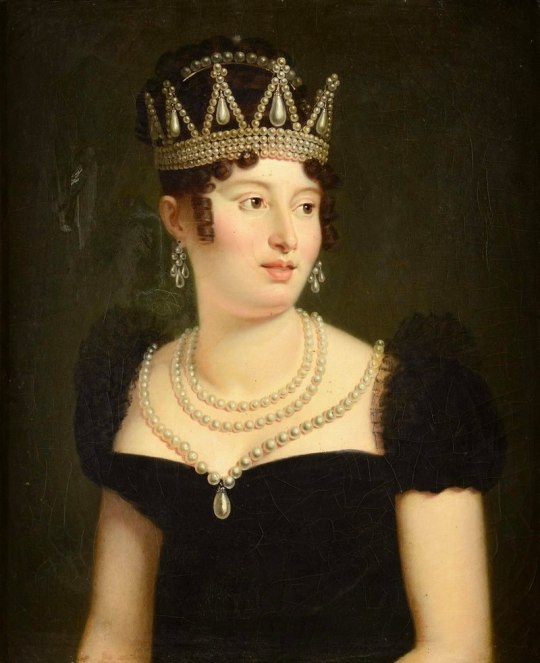
Carolina Maria Annunziata Bonaparte Murat Macdonald (25 March 1782 – 18 May 1839), better known as Caroline Bonaparte, was an Imperial French princess; the seventh child and third daughter of Carlo Buonaparte and Letizia Ramolino, and a younger sister of Napoleon I of France. She was queen of Naples during the reign of her spouse there, and regent of Naples during his absence four times: in 1812-1813, 1813, 1814, and 1815.
In 1800, Caroline married Joachim Murat Jordy, Marshal of the Empire, Prince Murat and later King of Naples, one of Napoleon's most important and notorious generals.
52 notes
·
View notes
Text
The two Englishmen meet Princess Pauline on Elba
The Princess, who occupied the large room in the centre of Bonaparte's residence, possessed a fine figure; her smile was fascinating, and her manners peculiarly pleasing. She received us with great affability, spoke much of the Empress and the young Prince, whom we had seen at Vienna: observed that it was cruel not to allow her [Marie-Louise] to join the Emperor; spoke with great affection of her brother, l'Empereur; said that he, with Maman and herself formed a little society, and played at cards in the evening; that the Emperor shewed himself a perfect philosophe, not bestowing a thought on what he had been, and frequently not reading the newspapers for some days after he received them; she observed,"qu'il travailloit beaucoup; and even there, as he had done elsewhere, was exerting himself to benefit and ornament the country.” In the course of our conversation, the Princess complained of the gross misrepresentations which were put forth in the public journals, respecting her brother; their denial of the benefits he had conferred on France, and the infamous slanders which had been propagated, especially through the Paris papers, as to his being deficient in personal courage. She expressed herself in very indignant terms on these points, and appeared to feel acutely what she conceived the unmerited calumnies that had been heaped upon a man who had done so much for the French people. She said, that at Rome we should see her brother Louis, an “excellent homme;” and Lucien, “qui avoit beaucoup esprit,” and desired us to say “bien de choses,” for her, to her sister at Naples.
Minutes of a conversation with Napolen Bonaparte, during his residence at Elba, in January 1815 by John Henry Vivian, 1839.
25 notes
·
View notes
Text
Excerpt from ‘Gioacchino Murat e l’Italia meridionale’ -- presentation of the King
Sooo guys. Some time ago i got a book, ‘Gioacchino Murat e l’Italia meridionale’ which was introduced to me by @joachimnapoleon and after reading it I thought of making a post about it. Hope you will enjoy it!
So let’s get started! In the third part of the book we have a focus on the people who actually governed Naples, starting with the King and the Queen and proceeding with the ministers, describing how their personalities fitted in their roles and how they actually got their work done; this post will be about our favourite King of Naples, Joachim Murat. (the mistakes in the translation are entirely mine)
Here the original text in italian
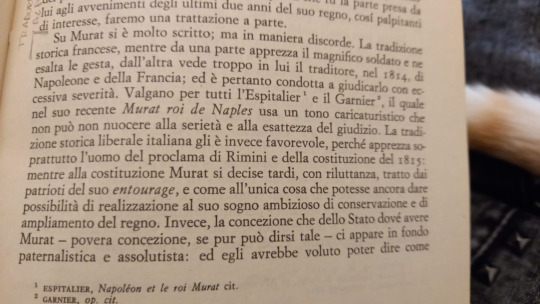
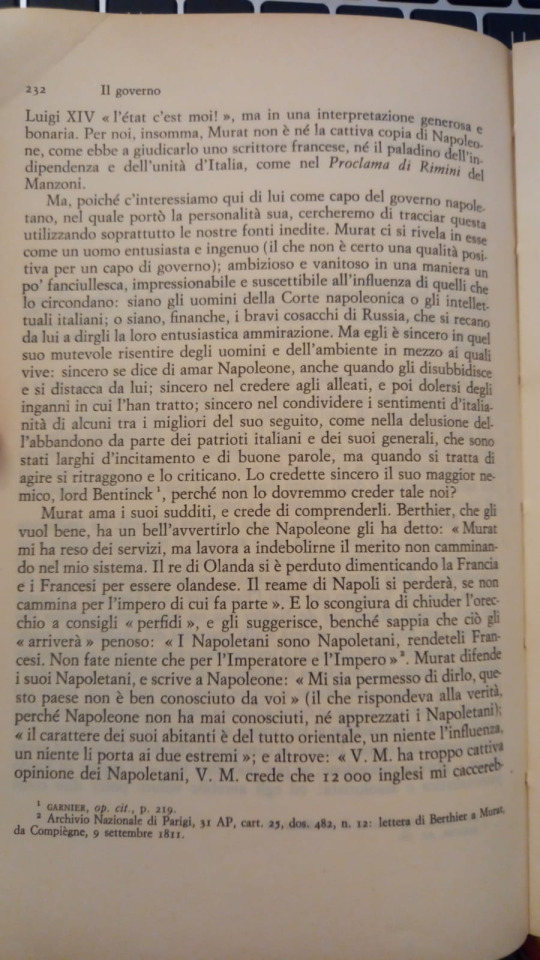
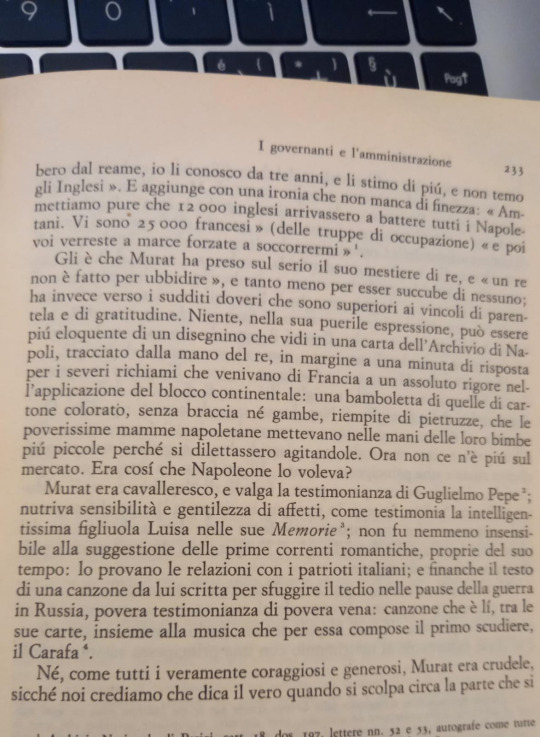
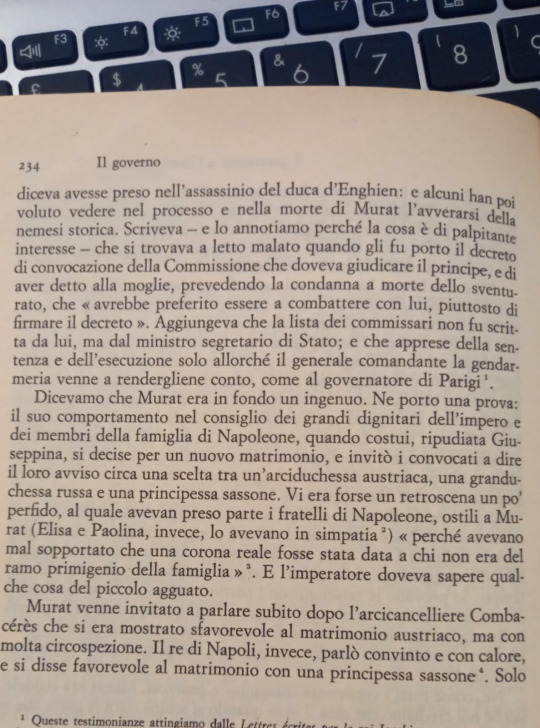

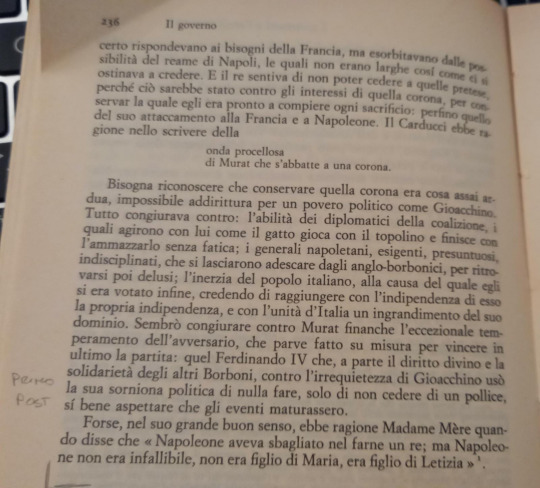
Much has been written on Murat, but in a discordant manner. While French historical tradition appreciates the magnificent soldier and exalts his deeds on one hand, on the other hand it sees too much of him as the traitor of Napoleon and of France in 1814 and so it’s brought to judge him with excessive severity; being worth of all Espitalier and Garnier who in his recent ‘Murat roi de Naples’ uses a caricatural tone that cannot not harm the seriousness and the accuracy of the judgment. The Italian liberal tradition is in his favour instead because it mainly appreciates the man of proclama di Rimini and the man of the 1815 constitution: while in reality Murat decided about creation of it lately and reluctantly, brought there by his entourage, as the only thing that could still give a chance of realization of his ambitious dream of his kingdom's conservation and expansion. However, the concept of the state that Murat must have had – a poor concept, even if it can be called such – seems to us paternalistic and absolutistic: he wished he could say ‘l’état ce moi!’ like Louis XIV but in a generous and good-natured manner. Being said so, for us Murat is neither Napoleon’s bad copy, as the French writer judged him, nor Italy’s paladin of independence and unity, as in Manzoni’s Il proclama di Rimini.
But, since we are interested in him as the head of the Neapolitan government, where he brought his personality, we’ll try to draw this one by using mainly our unpublished sources.
AAAAAND HERE WE START GUYS!!
In them Murat is revealed to us as an enthusiastic and naive (and this is sure not a positive quality for a head of government); ambitious and vain in a somewhat childish way, impressionable and susceptible to the influences of those who surround him: be them the man from the Napoleonic court or the italian intellectuals; or even the good cossaks from Russia, who went to tell him of their enthusiastc admiration. But he’s sincere in his changeable resentment of men and of the environment in which he lives: honest if he says he loves Napoleon, even when he disobeys and detaches himself from him; sincere in trusting the allies, and then grieving of the deception that they brought him; true in sharing the feelings of italianness of some of the best in his retinue, as in the disappointment of the abandonment by the Italian patriots and his generals, who are full of encouragement and good words, but when it comes to acting they draw back and criticize him. His greatest enemy, Lord Bentick, believed him, why shouldn’t we?
Murat loves his subjects, and believes he understands them. Berthier, who loves him, has warned him that Napoleon told him “Murat gave me some services, but works to weaken their merit by not following my system. The king of Holland has lost himself by forgetting France and Frenchmen to be Dutch. The Realm of Naples will lose itself if it doesn’t follow the empire, which it is a part of”. And begs him to shut his ears to ‘perfidious’ advices, and tells, even while knowing that this will be painful for him: “Neopolitans are Neopolitans, make them French. Don’t do anything that’s not for the Emperor and for the Empire”. Murat defends his Neopolitans, and Writes to Napoleon: “May I say, this country is not well known to you” (and this was truth because Napoleon has never known or appreciated Neopolitans); “His inhabitan’s character is completely oriental, a nothing sways it, a nothing bring it to the two extremes”; and elsewhere “VM has a too bad opinion of the Neopolitans, VM believes that 12000 Englishmen could kick me out from the kingdom, I’ve known them for three years, and I esteem them more, and I don’t fear the English”. And adds with an Irony that doesn’t lack finesse: “Let’s admit that 12000 English would manage to beat all the Neopolitans. There are 25000 French ”from the occupating troops“ and then you will come here in forced marches to rescue me”.
Ooops naps, how will you answer this?
The fact is, Murat took his job as a king seriously, and “the king was not made to obey”, and even less to be subject to anyone; instead he has duties towards his subjects that are superior to the bonds like blood and gratitude. Nothing in his pure expression can be more expressive than a drawing that I saw on a paper in Naples’ Archive, drawn by the king’s hand, at the side of a note answering on the stern reprimands that came from France demanding the absolute severity in the application of the Continental Blockade: a little doll made of colored cardboard, with neither arms nor legs, filled with pebbles, which a poor Neapolitan mum put gave to her little girls so that they would have fun shaking them. Now there’s no more on the market. Was it what Napoleon wanted from him?
Murat was chivalrous, and may Guglielmo Pepe's words be the testimony; He nourished sensitivity and kindness of affections, as very intelligent daughter Luisa testifies in her Memoirs; he was not even insensitive to the suggestion of the first romantic currents, typical of his time: the relations with the Italian patriots prove it; and even the text of a song he wrote to escape the tedium in the breaks of war in Russia, poor testimony of poor vein: song that is there, between the His cards together with the music that for it composed the first squire, Carafa'.
Nor, like all truly courageous and generous, was Murat cruel, so we believe he speaks the truth when he excuses himself about the part he was said to have taken in the assassination of the Duke of Enghien: and some then wanted to see in the trial and death of Murat the coming of the true historical nemesis. He wrote - and we note it because this is of big interest that he was in bed sick when the decree of convocation of the Commission that was to judge the prince was brought to him, and to have told his wife, foreseeing the death sentence of the unfortunate man, that «he would rather be fighting, rather than signing the decree». He added that the list of commissioners was not written by him, but by the minister secretary of state; and that he learned of the sentence and of the execution only when the general commander the gendarmerie came to give him an account, as he was the governor of Paris.
We said Murat was basically naive. I bear proof of this: his behaviour at the council of the great dignitaries of the empire and of the members of Napoleon’s family, when he, repudiated Josephine, decided on a new marriage, and invited the summoned to give their advice about a choice between an Austrian archduchess, a Russian grand duchess, and a Saxon princess. There was a somewhat perfidious backstory, in which Napoleon’s brothers, hostile to Murat (Elisa and Pauline, on the other hand, had a liking for him) «because they had badly endured that a royal crown had been given to those who were not of the first branch of the family». And the emperor must have known something about the little ambush.
Murat was invited to speak immediately after the Archchancellor Combacérès who had shown himself to be unfavorable at the Austrian wedding, but with much circumspection. The king of Naples, however, spoke with conviction and warmth, and said he was in favour of marriage to a Saxon princess. Only when all were convinced of their marriage to an archduchess, did he realize that he was the only one to ignore the secret of the emperor, because Combacérès had to have an assigned part to better induce him to speak. And he also had the pleasure of grieving with his brother-in-law: When your determination was taken, why did I not know of the secret, why interrogate me, and expose me to the enmity of Austria and the Archduchess? You know that, after the marriage of Eugene, I am small partisan of the alliances of your family with the old dynasties».
Joachim had a boundless admiration and love for Napoleon. He, for his part, treated him as a good horse, which occasionally rears, but, will always remain in the subjection of the master, knowinghowtohandleit. But the emperor often lacked tact in the relations with his brother-in-law, answering long silences with some scornful praises, and harsh reproaches, which sounded like stirrups for Joachim, sensitive and shady, and that much presumed of himself, as a warrior and as a ruler. In addition, the Emperor made enormous demands, which certainly met the needs of France, but they went beyond the possibilities of the realm of Naples, which were not as large as one persisted to believe. And the king felt he could not give in to the demands because that would be against the interests of the crown, in order to preserve which he was ready to make any sacrifice: even of his attachment to France and Napoleon. About which Carducci was right to write
“onda procellosa procellous wave
di Murat che s'abbatte a una corona.” Of Murat falling to a crown.
It must be recognized that keeping that crown was a very difficult thing, even impossible for a poor politician like Joachim. Everything conspired against it: the lability of the diplomats of the coalition who acted with him as cat playing with mouse and ended up killing him without any static; the Neapolitan generals, demanding, presumptuous, unruly, who let themselves be lured by England. The Italian people’s inertia, for whose cause he had finally voted, believing that, with its independence, it would achieve its own independence, and with the unity of Italy, an enlargement of its dominion. It seemed to conspire against Murat even the exceptional temperament of the opponent, who seemed tailor-made to win the game last: that Ferdinand IV who, apart from the divine right and the solidarity of the other Bourbons, against the Joachim’s restlessness used his sly policy of doing nothing, only not to give in an inch, as well as waiting for the events to ripen.
Perhaps, in her great common sense, Madame Mère was right when she said that «Napoleon had been wrong in making a king; but Napoleon was not infallible, he was not the son of Mary, he was the son of Letizia».
I hope you enjoyed this and i thank @tairin for having been a real sweetheart in accepting to beta this and @joachimnapoleon for having talked to me about this great book... it took me a while to finish it but it was really a great reading!! I will probably try to translate some other passages so stay tuned... i suppose?
21 notes
·
View notes